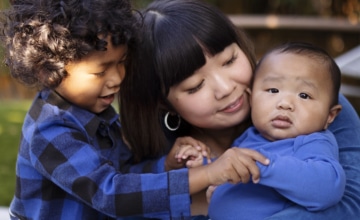It’s common to have a lot of questions about how to discuss children’s bodies and how to respond to their early interest in sexual play. Through supportive and thoughtful responses, parents can ensure their children learn to love and trust themselves, feel proud of their bodies, and build the foundation of healthy self-esteem.
Tip: Use anatomically correct names for bodies, including genitals.
Children notice when only certain parts of their bodies receive special names (or aren’t named at all!) and this can cause confusion or shame. Proper terms for body parts may feel embarrassing for adults to use with children. But, if you use these terms right from the start, it becomes more natural when children are old enough to ask questions. Knowing the grown-up words also gives children a sense of “ownership” of their own bodies and lets them know it’s okay to talk about body parts. This practice also gives children the words they would need to tell you about discomfort they are feeling or sexual abuse.
Tip: Gender identity starts emerging at about 2 years of age.
 Sometime around 2 years old, most children begin to notice the physical differences between boys and girls. Over the next 2–3 years, your child will likely come to identify as either a boy or girl. For many children, these early gender roles may seem very rigid—a little girl refusing anything that isn’t pink or a boy thinking that a woman with short hair must be a man. This reflects children’s growing understanding of what it means to be male or female. You can help children develop broader views of gender by sharing stories about men and women in non-traditional roles, offering children a variety of toys to play with, and modeling respect for both sexes.
Sometime around 2 years old, most children begin to notice the physical differences between boys and girls. Over the next 2–3 years, your child will likely come to identify as either a boy or girl. For many children, these early gender roles may seem very rigid—a little girl refusing anything that isn’t pink or a boy thinking that a woman with short hair must be a man. This reflects children’s growing understanding of what it means to be male or female. You can help children develop broader views of gender by sharing stories about men and women in non-traditional roles, offering children a variety of toys to play with, and modeling respect for both sexes.Many children engage in playful dress-up activities and role-plays that may be associated with the opposite gender—like a boy pretending to be a princess or a girl pretending to be a Daddy. This behavior is quite typical and expected, and doesn’t necessarily mean a child is gay or identifying with the opposite gender.
Tip: Gender identity usually, but not always, lines up with a child’s sex.
Most children’s gender identity matches their biological sex—that is, a boy identifies as a boy. For other children, their gender identity does not reflect their biological sex. A child who is biologically a boy may identify as a girl, and vice versa. With stories in the news of people who identify as the opposite gender, parents may wonder if their children are transgender, and how to support them if they are. Parents should know that it’s common for little kids to pretend they’re the opposite gender, and uncommon for kids to be transgender. (Experts say about 6 in 1000 adults in the U.S. identify as transgender.
Our current understanding of gender is that it is a central part of your child’s being—it is not something you created, nor is it something you or your child can change. Think of gender identity as similar to having blue eyes or being right-handed. It’s not bad or good: It just is. Ask your child’s health care provider if you have questions about gender identity. The most important thing for any child to know is that they are fully accepted and loved for who they are.
Tip: Body exploration, sexual play and masturbation is a normal and healthy part of development for both boys and girls.
 In the first few years of life, children show interest in their own, as well as others’, “private” areas. Many babies discover their genitals and touch them, from infancy forward.
In the first few years of life, children show interest in their own, as well as others’, “private” areas. Many babies discover their genitals and touch them, from infancy forward.Parents can either ignore this behavior (because it is quite normal) or simply state what is happening, “You found your penis!” or, “That’s your vulva.” Once children are older, it is appropriate to set limits on this behavior to teach privacy and boundaries. For example, it’s wise to teach toddlers not to touch their genitals in public. It’s also smart to teach children that particular parts of the body are private and only parents, doctors, or the child can touch them. If children touch their genitals in public, gently and calmly remind them that this activity is private.
Parents may feel embarrassed, surprised, or disturbed seeing their child exploring her body in this way. However, calm, matter-of-fact reactions allow children to learn about public and private behaviors, how to stay safe, and develop a sense of body awareness (that their body belongs to them). Using punishment or conveying disapproval can cause children to feel bad about themselves or their bodies—and may teach them they can’t come to parents with questions or worries.
Tip: Know the signs for when to talk to your child’s health care provider.
Masturbation and curiosity about genitals are both perfectly normal in young children. But there is a point when this normal and typical activity can raise a concern. Seek advice from your pediatric care provider if your child:
- is not able to stop touching his genitals, even when reminded (i.e., sexual play is compulsive);
- tries to involve others in the activity;
- simulates adult sexual acts or uses adult sexual talk; or
- begins to exhibit symptoms of behavioral/emotional difficulty (increased aggression, sadness, withdrawal, or toileting accidents after learning to use the toilet).
References
1Flores, A.R., Herman, J. L., Gates, G.J., and Brown, T.N.T. How Many Adults Identify As Transgender in the United States? Retrieved from online.





